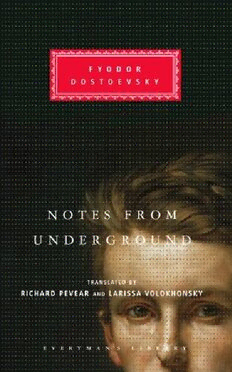
Notes from Underground PDF
Preview Notes from Underground
Notes from Underground Fyodor Dostoevsky TranslatedfromtheRussianby: RichardPevear LarissaVolokhonsky Withanintroductionby: RichardPevear Everyman’sLibrary Contents Introduction iii 1 Part One: Underground 3 2 Part Two: AproposoftheWetSnow 37 Notes 115 i i n t r o d u c t i o n TheellipsisaftertheopeningsentenceofNotesfromUnderground is like a window affording us a first glimpse of one of the most re- markablecharactersinliterature,onewhohasbeenplacedamongthe bearersofmodernconsciousnessalongsideDonQuixote,Hamlet, andFaust. Whatweseeisamanglancingatusoutofthecornerof hiseye, verymuchawareofusashespeaks, verymuchconcerned withtheimpressionhiswordsaremaking. Infact,wedonotreally seehim,weonlyhearhim,andnotthroughanythingsorespectable asawindow,butthroughacrackinthefloorboards. Headdresses theworldfromthatcrack;hehasalsospentalifetimelisteningatit. Everythingthatcanbesaidabouthim,andmoreparticularlyagainst him,healreadyknows;hehas,ashesaysinatypicalparadox,over- hearditall,anticipateditall,inventeditall. ”Iamasickman…Iam awickedman.”InthespaceofthatpauseDostoevskyintroducesthe unifyingideaofhistale: theinstability,theperpetual”dialectic”of isolatedconsciousness. Thenamelesshero–nameless”becauseI is allofus,”thecriticViktorShklovskysuggested—is,likesomanyof Dostoevsky’sheroes,awriter. Notaprofessionalmanofletters(none ofDostoevsky’s”writers”isthat),butonewhomcircumstanceshave ledorforcedtotakeupthepen,totrytofixsomethinginwords,for hisownsakefirstofall,butalsowithaneyeforsomeindeterminate others—readers,critics,judges,fellowcreatures. Heisapassionate amateur,aconditionthatmarksthestyleandstructureaswellasthe contentofthebook. Wherethemasterpractitionerwouldpresentus withaseamlessandharmoniousverbalconstruction,themanfrom underground,wholiterallycannotcontainhimself,breaksdecorum all the time, interrupts himself, comments on his own intentions, defieshisreaders,polemicizeswithotherwriters. Theliterarinessof his”notes”andtheunliterarinessofhisstylearebothresultsofhis ”heightenedconsciousness,”hishostilitytoanddependenceuponthe introduction wordsofothers. ThustheunifyingideaofNotesfromUnderground, embodiedinthepersonofitsnarrator,isdramatizedintheprocess ofitswriting. ThecontrollingartofDostoevskyremainsatasecond remove. Thismanwhomaybetryingtowritehiswayoutoftheunder- ground,originallyreadhiswayintoit. ”Athome,”hesays,”Imainly usedtoread. Iwishedtostiflewithexternalsensationsallthatwas ceaselesslyboilingupinsideme. Andamongexternalsensationsthe onlyonepossibleformewasreading. Readingwas,ofcourse,agreat help–itstirred,delighted,andtormentedme.”Thatwasduringhis youth,inthe1840s. Heread,hedreamed,andheengagedin”little debauches.”Thesewerehisthreediversions,anditisinterestingthat heputsthemtogether. Whatdidheread? Atvariouspointsinhis accounthecompareshimselfwithByron’sManfred,withcharacters fromPushkinandLermontov—allromanticfigures. Herefersmore thanoncetoRousseau. Fartherinthebackground,butloominglarge, standKantandSchiller,representingGermanphilosophicalandpo- eticidealism,summonedupinthephrase”thebeautifulandlofty,” whichhadbecomeacommonplaceofRussianliberalcriticismofthe 1840s. Hisreadingwas,inotherwords,thatofthetypicaleducated Russianofthetime.Readingnourishedhisdreaming,andevenfound itswayintohislittledebauches”inexactlytheproportionrequired foragoodsauce.”Andsoitwasthatheevadedthepettysqualorand inneranguishofhisdailylife;soitwas,asheconfessessixteenyears later, that he ”defaulted on his life through moral corruption in a corner.”Onemainthematicstrandofthebookistheunderground man’sdenunciationoftheestrangingandvitiatinginfluenceofbooks, sothatfromhisperspectiveofthe1860s,whenhebeginstowrite, theword”literary”hasbecomeoneofthemostsarcastichecanutter. ToallthefeaturesforanantiheropurposelycollectedinNotesfrom Underground thereareaddedallthefeaturesforanantibook. That book is the underground man’s book, not Dostoevsky’s, thoughthetwocoincidealmostwordforword. Indeed,thesharp personalityoftheundergroundman,theintensityofhisattacksand confessions,theapparentlackofcriticaldistanceinthefirstperson narrative,havegivenmanyreaderstheimpressionthattheyhavetodo iv Notes from Underground herewithadirectstatementofDostoevsky’sownideologicalposition, andmuchcommentaryhasbeenwrittenonthebookinthatlight. Muchhasalsobeensaidaboutthetragic(oratleast”terriblysad”) essence of its vision. Both notions seem to overlook the humor – stylistic,situational,polemical,parodic–thatpervadesNotesfrom Underground. Dostoevskycertainlyputalotofhimselfintothesitua- tionsandemotionsofhisnarrator;whatdistinguisheshisbookfrom thenarrator’sisanextradimensionoflaughter. Laughtercreatesthe distancethatallowsforrecognition,withoutwhichthebookmight beatract,acasehistory,acryofdespair,anythingyoulike,butnota workofart. NotesfromUnderground hasbeencalledthepreludeto thegreatnovelsofDostoevsky’slastperiod,anditissopartlybecause hereDostoevskyfirstperfectedthemethodoftonaldistancingthat enabledhimtopresentcharactersandeventssimultaneouslyfrom differentpointsofview,tocounterempathywithintellection. Theundergroundman’sbookisapersonaloutpouring–harsh, self-accusatory, defiant, negligentlywritten, looselystructured–a longdiatribe,followedbysomeavowedlyrandomrecollections(”I will not introduce any order or system. Whatever I recall, I will writedown.”)Itclaimstobegenuine,ifartisticallycrude. ”Nolonger literature, butcorrectivepunishment,”thenarratorfinallydecides. Nietzschethoughthecouldhear”thevoiceoftheblood”init. Dostoevsky’snovelissomethingquitedifferent. Itisatragicom- edyofideas,admirableforthedramaticexpressivenessofitsprose, whichgivessubtlelifetothisvoicefromunderthefloorboardswithall itswithholdings,secondthoughts,loopholes,specialpleadings;and admirable,too,forthedynamicsofitscomposition,theinterplayof itstwoparts,whichrepresenttwohistoricalmoments,two”climates of opinion,” as well as two images of the man from underground, revealedbydifferentmeansandwithverydifferenttonalities. ThetwopartsofNotesfromUnderground werefirstpublished in1864,intheJanuaryandAprilissuesofEpoch,amagazineedited by Dostoevsky’s brother Mikhail, the successor to their magazine Time,whichhadbeensuppressedbythecensorsin1863. Thenote Dostoevskyaddedtothefirstpartinsistsonthesocialandtypical, asopposedtopersonalandpsychological,aspectsofthemanfrom v introduction underground: ”such persons as the writer of such notes not only maybutevenmustexistinoursociety,takingintoconsiderationthe circumstancesunderwhichoursocietyhasgenerallybeenformed.” Hisviewofthosecircumstanceswouldhavebeenfamiliartoreadersof hisarticlesinTimeoverthepreviousfewyears,particularly”Winter NotesonSummerImpressions,”anaccountofhisfirsttriptoEurope in1862,whichhadappearedintheFebruaryandMarchissuesof Time for 1863. There he discussed Russia’s ”captivation” with the West: Why,everything,unquestionablyalmosteverythingthat wehave–ofdevelopment,science,art,civic-mindedness,hu- manity,everything,everythingcomesfromthere–fromthat samelandofholywonders! Why,ourentirelife,evenfrom verychildhooditself,hasbeensetupalongEuropeanlines. Russiansocietyhadbeenformedbydecadesofimported”develop- ment”and”enlightenment,”wordsthatacquireasharplyironicin- flectioninDostoevsky’slaterwork. Somesourcesofthisideology havealreadybeenmentioned–Rousseau,Schiller,Kant. Tothislist maybeaddedthenamesofsuchFrenchsocialromanticsasVictor Hugo,EugeneSue,GeorgeSand,andtheUtopiansocialistsFourier andSaint-Simon. InDostoevsky: TheStirofLiberation,JosephFrank pointstothepresenceofthese”influences”inthethemeofthere- deemedprostitute,whichwasafavoriteamongRussianliberalsof the1840s(thepoetNikolaiNekrasov,forexample),andwhichDos- toevskyparodiesbrilliantlyinthesecondpartofNotesfromUnder- ground. Theparodyis,ofcourse,Dostoevsky’s,nottheunderground man’s. Thelatter,onthecontrary,hadtakenalltheseinfluencesto heart;theyhadmadehimintoa”developedmanofthenineteenth century,”amanof”heightenedconsciousness.”Itwastheattemptto livebythemthatdrovehim”underground.”Inthesocialdisplace- mentofanimportedculture,Dostoevskyperceivedamoreprofound humandisplacement,aspiritualvoidfilledwithforeigncontent. Asecondthemefrom”WinterNotes”reappearsinNotesfrom Underground –thatofthe”crystalpalace,”whichisascentraltothe polemicsofthenovel’sfirstpartastheredeemedprostituteistothe vi Notes from Underground parodyofthesecond. Thecrystalpalaceinthetravelarticleisthe cast-ironandglassexhibitionhallbuiltinLondonin1851forthe GreatExhibition. ItappearedtoDostoevskyasaterrifyingstructure, a symbol of false unity, of ”the full triumph of Baal, the ultimate organizationofananthill.”Thetonesinwhichhespeaksofitwill beechoedalmosttwentyyearslaterbytheGrandInquisitorinThe BrothersKaramazov: Butifyousawhowproudisthatmightyspiritwhocreated thiscolossalsettingandhowproudlyconvincedthisspiritis ofitsvictoryandofitstriumph,thenyouwouldshudderfor itspride,obstinacy,andblindness,butyouwouldshudderalso forthoseoverwhomthisproudspirithoversandreigns. Thismightyspiritisthespiritofindustrialcapitalism,andthecrystal palaceisitstemple. InNotesfromUnderground thesamestructure comestostandforthefutureorganizationofsocialism. Itremainsan imageoffalseunity,butisdenouncedinratherdifferentterms: the undergroundmanputshistongueoutatit,callsitatenementhouse andachickencoop. Thetwotimeperiodsofthenovelrepresenttwostagesinthe evolutionoftheRussianintelligentsia:thesentimental,literary1840s andtherationalandutilitarian1860s;thetimeoftheliberalsandthe timeofthenihilists. OneofDostoevsky’sconstantpreoccupations inhislaterworkwastheresponsibilityoftheliberalgenerationfor theemergenceofthenihilists,anideaheembodiedliterallyinthe novelDemons(1871-72)inthefiguresofthedreamyindividualist StepanVerkhovenskyandhisdeadlyutilitariansonPyotr. InNotes fromUnderground thesameevolutionisreflectedinthemindofone man: thepolemicistofthefirstpartgrewoutofthedefeateddreamer ofthesecond. Theinvertedtimesequenceofthetwopartsseemsto leadustothisdiscovery. However,theundergroundmanishardlyatypical”rationalego- ist,”anymorethanhehadbeenatypicalromantic. Thereisaquality inhimthatsetshimapart,whichhehimselfdefinesonthelastpage ofthebook: ”Excuseme,gentlemen,butIamnotjustifyingmyself withthisallishness. AsfarasImyselfamconcerned,Ihavemerely vii
